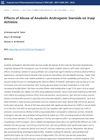 8 citations,
April 2019 in “Journal of the Endocrine Society”
8 citations,
April 2019 in “Journal of the Endocrine Society” Postmenopausal women with hyperandrogenism didn't have better metabolic health even after their testosterone levels became normal.
 16 citations,
April 2012 in “Gynecological Endocrinology”
16 citations,
April 2012 in “Gynecological Endocrinology” Older obese women with PCOS have higher cardiovascular and metabolic risks despite lower androgen levels.
 67 citations,
February 2010 in “Acta Obstetricia et Gynecologica Scandinavica”
67 citations,
February 2010 in “Acta Obstetricia et Gynecologica Scandinavica” Hirsutism is a strong sign of high male hormones and metabolic problems in women with PCOS, but acne and hair loss are not.
4 citations,
December 2021 in “Pharmacological Reports” Metformin is less effective in men with early-onset hair loss.
May 2022 in “The Journal of Clinical Pharmacology” Metformin reduces certain hormone levels in men with early-onset hair loss.
 6 citations,
December 2022 in “Frontiers in Pharmacology”
6 citations,
December 2022 in “Frontiers in Pharmacology” Quercetin may help improve symptoms of polycystic ovary syndrome.
 3 citations,
May 2021 in “Molecules”
3 citations,
May 2021 in “Molecules” Rosuvastatin improves lipid levels, reduces inflammation, but worsens insulin sensitivity in men with early-onset hair loss.
 17 citations,
May 2012 in “Clinical Endocrinology”
17 citations,
May 2012 in “Clinical Endocrinology” Surgery to lower high testosterone in postmenopausal women with certain ovarian tumors doesn't significantly affect their metabolism.
 24 citations,
January 2015 in “International Journal of Trichology”
24 citations,
January 2015 in “International Journal of Trichology” Early balding in young Indian men may indicate a higher risk of metabolic syndrome and potential heart disease.
April 2024 in “Journal of clinical medicine” Classical PCOS types A and B are most common and linked to higher health risks.
 3 citations,
March 2023 in “Life”
3 citations,
March 2023 in “Life” Obesity can worsen wound healing by negatively affecting the function of stem cells in fat tissue.
 6 citations,
January 2021 in “International Journal of Molecular Sciences”
6 citations,
January 2021 in “International Journal of Molecular Sciences” Finasteride-treated male rats' offspring had altered glucose metabolism, potentially increasing diabetes risk.
 September 2019 in “Journal of evolution of medical and dental sciences”
September 2019 in “Journal of evolution of medical and dental sciences” Obesity significantly affects skin health, causing conditions like acanthosis nigricans and skin tags, and should be considered during skin exams.
 15 citations,
August 2021 in “Reviews in endocrine and metabolic disorders”
15 citations,
August 2021 in “Reviews in endocrine and metabolic disorders” COVID-19 and hypopituitarism (reduced pituitary gland function) are linked, with the latter's related health issues potentially worsening COVID-19 outcomes, and COVID-19 possibly increasing risk for pituitary complications.
 May 2023 in “Journal of Cosmetic Dermatology”
May 2023 in “Journal of Cosmetic Dermatology” Being overweight can cause or worsen skin problems in children, some more common in darker skin, and is often linked to insulin resistance.

Drinking sweetened tea and poor sleep habits may increase the risk of hair loss in women.
 December 2011 in “The Diabetes Educator”
December 2011 in “The Diabetes Educator” The Blood Glucose Management Service improved patient safety and outcomes in managing blood sugar in hospitalized patients.
 14 citations,
August 2014 in “Applied Physiology, Nutrition, and Metabolism”
14 citations,
August 2014 in “Applied Physiology, Nutrition, and Metabolism” A low-starch/low-dairy diet may help overweight women with PCOS lose weight and improve metabolism, but more research is needed.
 11 citations,
November 2015 in “Journal of Functional Foods”
11 citations,
November 2015 in “Journal of Functional Foods” Hibiscus petals improved blood sugar and stress responses in diabetic rats.
 January 2025 in “Heliyon”
January 2025 in “Heliyon” Tamsulosin and finasteride have similar effects on blood sugar control in men with type 2 diabetes.
 36 citations,
July 2011 in “Journal of The American Academy of Dermatology”
36 citations,
July 2011 in “Journal of The American Academy of Dermatology” People with hair loss have higher risk of high blood sugar and diabetes, and lower levels of a specific hormone.
April 2019 in “Journal of the Endocrine Society” An over-the-counter vitamin/mineral supplement improved hair loss and blood sugar control in a woman with non-classic 11-hydroxylase deficiency.
 March 2017 in “Iraqi Journal of Pharmaceutical Sciences”
March 2017 in “Iraqi Journal of Pharmaceutical Sciences” Abuse of anabolic steroids in Iraqi athletes leads to negative effects on hormones, liver and kidney function, blood sugar, and cholesterol levels.
16 citations,
January 2016 in “Indian Journal of Dermatology, Venereology and Leprology” Metabolic syndrome is more common in people with early-onset androgenic alopecia.
 April 1978 in “Pediatric research”
April 1978 in “Pediatric research” Patients with anorexia nervosa did not show a correlation between zinc levels and taste perception or the severity of their condition.
 15 citations,
July 2012 in “Biological trace element research”
15 citations,
July 2012 in “Biological trace element research” Higher hair calcium to magnesium ratios and lower chromium levels in hair may indicate insulin resistance in Korean men.
 67 citations,
May 2018 in “Journal of Ginseng Research”
67 citations,
May 2018 in “Journal of Ginseng Research” Red ginseng may improve immunity, fatigue, memory, blood circulation, and menopausal symptoms, and is generally safe to consume.
 1 citations,
December 2018 in “IntechOpen eBooks”
1 citations,
December 2018 in “IntechOpen eBooks” Human hair shows promise for non-invasive medical testing, but more research is needed to standardize its use.
 6 citations,
April 2019 in “Journal of Pediatric Endocrinology and Metabolism”
6 citations,
April 2019 in “Journal of Pediatric Endocrinology and Metabolism” Metformin improved menstrual cycle regularity and signs of hyperandrogenism in adolescent girls with type 1 diabetes but did not improve blood sugar control.
 6 citations,
January 2019 in “F1000Research”
6 citations,
January 2019 in “F1000Research” High triglyceride levels are a key factor affecting testosterone levels in women with PCOS.
























